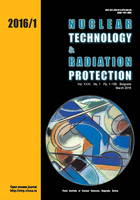
NEW HEAD PROCESS FOR NON-HEU 99Mo PRODUCTION BASED ON THE OXIDATION OF IRRADIATED UO2-PELLETS FORMING SOLUBLE U3O8
Pages: 102-108
Authors: Gerd Juergen Beyer, Bernd Eichler, Teja Reetz, Rudolf Muenze, and Jožef J. Čomor
Abstract
All fission-based 99Mo producers worldwide are required to convert their 99Mo production processes from using highly enriched uranium to low-enriched uranium. At a recent IAEA meeting in Vienna, problems related to bottlenecks and target modification and optimization of low-enriched uranium-based 99Mo production processes were discussed. Ceramic UO2-pellets (as used in fuel) were excluded from the discussion with the argument that this material cannot be dissolved under practically applicable conditions. In this paper, we suggest transforming the non-soluble ceramic UO2 fuel-pellets into the U3O8 form by simple oxidation and the use of the soluble U-oxide modification as the starting material for the 99Mo production processes. Due to the absence of Al, larger target quantities could be processed and the waste volume could still be kept small. The approach is known and proven in nuclear technology. In principle, this new head process can be connected to any of the presently used 99Mo production procedures.
Key words: low-enriched uranium, higly enriched uranium, UO2, U3O8, 99Mo, voloxidation
FULL PAPER IN PDF FORMAT (5.62MB)
